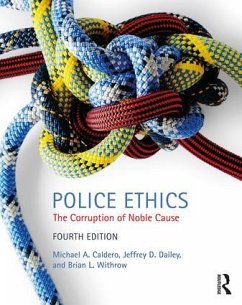Police Ethics, Fourth Edition, provides an analysis of corruption in law enforcement organizations. The authors argue that the noble cause-a commitment to "doing something about bad people"-is a central "ends-based" police ethic. This fundamental principle of police ethics can paradoxically open the way to community polarization and increased violence, however, when officers violate the law on behalf of personally held moral values. This book is about the power that police use to do their work and how it can lead police to abuse their positions at the individual and organizational levels. It provides students of policing with a realistic understanding of the kinds of problems they will confront in the practice of police work.
This timely new edition offers police administrators direction for developing agency-wide corruption prevention strategies, and a re-written chapter further expands our level of understanding of corruption by covering the Model of Circumstantial Corruptibility in detail. The fourth edition also discusses critical ethical issues relating to the relationship between police departments and minority communities, including Black Lives Matter and other activist groups. In the post-Ferguson environment, this is a crucial text for students, academicians, and law enforcement professionals alike.
This timely new edition offers police administrators direction for developing agency-wide corruption prevention strategies, and a re-written chapter further expands our level of understanding of corruption by covering the Model of Circumstantial Corruptibility in detail. The fourth edition also discusses critical ethical issues relating to the relationship between police departments and minority communities, including Black Lives Matter and other activist groups. In the post-Ferguson environment, this is a crucial text for students, academicians, and law enforcement professionals alike.








